Round 4 of Pittsburgh Chess Club tournament: the agony of losing a won game against the difficult opponent
After round 3 last week of the current Pittsburgh Chess Club Tuesday night tournament, I noted that I was going to face a difficult opponent in round 4.
Well, I lost my game against him tonight, after four hours of play (we were the last game to finish):
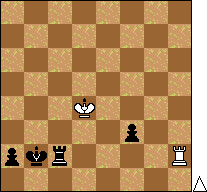
This is the first chess game I’ve reported on in this blog in which I lost!
What lessons from losing?!
What makes this loss particularly agonizing is that I had an advantage for a long time in the game (and had a win at one point), and entered an endgame a solid Pawn up such that if I were playing for a draw, there would not be any way to fail, but instead I made error after error until I lost. Even worse, I actually had a drawn position just moves before I resigned.
Here’s what happened.
The complete annotated game
At your convenience, you can enjoy playing over the game with my annotations, including diagrams.
Preparation
I was faced with the psychological challenge of playing a “difficult opponent”, which I define as someone who I have a bad score against. I had lost one game to my opponent and drawn one game that I almost deserved to lose.
As White, I had the choice of playing into one of his favorite openings or avoiding it. I ended up doing something halfway: allowing his opening but choosing a different way of responding to it. I did this with the expectation of reaching a certain kind of middle game that would be solid for me as White: a Ruy Lopez kind of position.
Overview of my game
The opening
My opponent again tried to enter the Philidor Defense through a Pirc Defense move order. I varied with the quiet Bd3 variation in order to bolster my e4 and d4 center with c3.
I made some inaccuracies in the opening by not playing an early Be3 that would have guaranteed a safe advantage.
Still, I achieved a solid position:
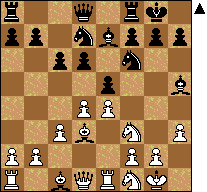
The middle
Then, out of the blue, my opponent creatively embarked on a Pawn sacrifice.
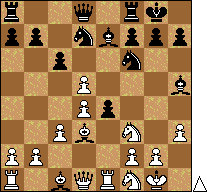
The way he played it was actually completely unsound, such that if I had taken the time to find the best moves, I would have won. But it was a creative idea: it was meant to be a positional sacrifice, choosing to lose a Pawn in order to gain the advantage of the two Bishops and better development. It should not have worked, however.
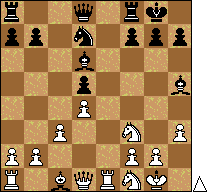
His bluff worked, and I fell into a position in which although I was one Pawn up and had the advantage, it was not going to be trivial to actually win rather than draw.
After I finished developing my pieces, I immediately traded into an endgame in which I was a Pawn up and objectively had no chance of losing.
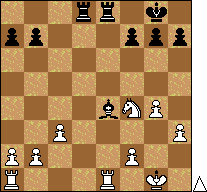
The end
Here’s where things got weird. When I realized that I did not have much of a chance of winning, I started dreaming up strange attacks that ended up not working at all. I started losing Pawns, my Knight ended up much worse than his Bishop (thereby justifying his positional sacrifice in the first place to get the Bishop), and I was dead lost.
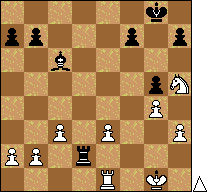
Then magically, at some point he started playing poorly, to the point at which I finally achieved a drawn position!
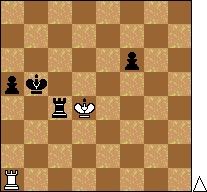
But at that very moment, I played an incomprehensibly terrible move, and immediately after that, realized I was lost. The rest of the game was meaningless given that. I resigned when he was about to Queen a Pawn.

Lessons learned
- Even when playing a solid, safe opening, an enterprising opponent might be able to surprise with an unsound sacrifice that blows the position up.
- I should have spent more time finding the refutation of the sacrificial line.
- Simplifying to an ending is natural when ahead in material, but was the wrong thing to do when it was possible to maintain more tension.
- In a drawn endgame, I got discouraged and started playing to lose. Terrible.
- Even in a lost endgame, there are opportunities to draw; I missed the final drawing move.
What next?
Well, I now lose the lead in the tournament. I don’t know yet whom I’ll be playing in round 5. I have probably lost the chance to win this tournament, as a result of my loss, but I intend to play well during the final two rounds!
Conclusion
It’s always tough to lose a chess game. It’s especially hard when you identify the kinds of errors you made and what you could have done differently and thought about but decided poorly.

Hi Franklin. I liked reading your take on our game, and I agree with most of your assessments. However, you didn't miss a draw when you played 51.Kd5. That did hasten the end, but the position after 51.Kd3 is still lost (which is confirmed by tablebase), so no need to kick yourself over that. After 51.Kd3 Black can still make progress along the lines of the game, methodically advancing both pawns. The thing is, the white king can't avoid getting cut out of the action at some point, one way or the other. Anyway, though I know I'm due for a change in fortune, I look forward to our next roller coaster struggle!
Thanks for the correction of my claim of a draw near the end! I didn't use a tablebase during my quick and dirty post-mortem analysis... when I have time after a week or two, I'll go through the endgame thoroughly and update the blog post and annotated game. Good luck in the rest of the tournament :-).